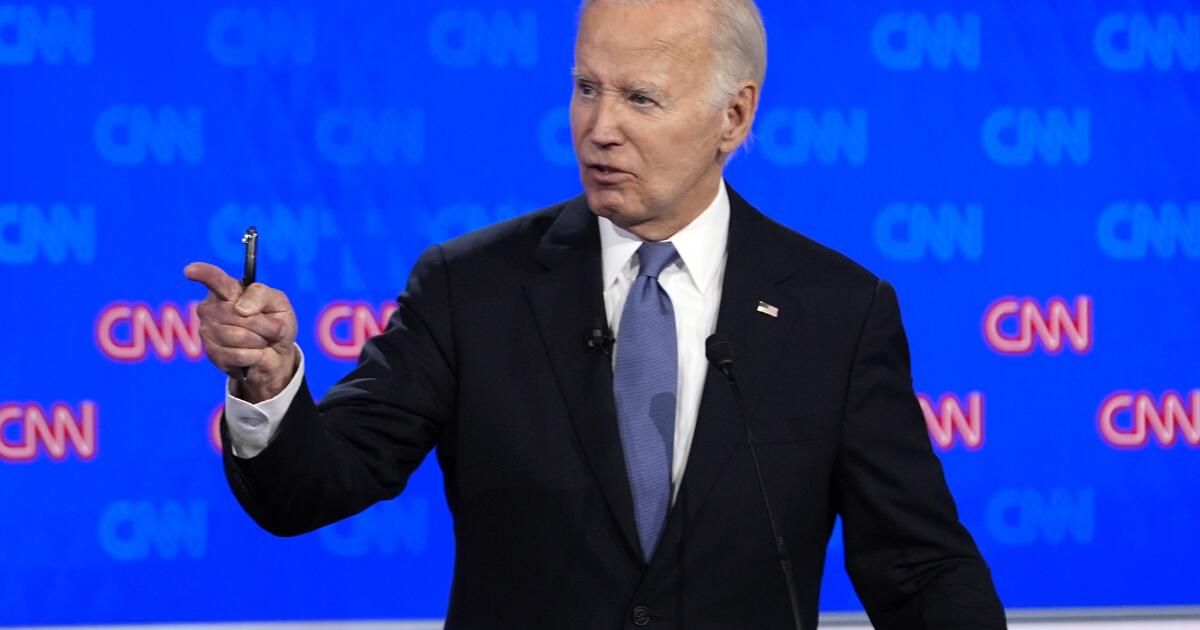A couple of weeks ago, I wrote about a TV ad that asked whether President Biden’s claims about the economy were a case of dishonesty or insanity.
You can't diagnose dementia from a distance, I wrote.
Then came the debate last week and I started getting teased.
“There’s no lying about it anymore,” said a reader named Bob. “We all saw it.”
What I saw was a man who walked stiffly, who struggled to maintain coherence and who sometimes seemed confused. He seemed to suffer from some kind of disability.
California is about to be hit by a wave of aging, and Steve Lopez is taking advantage of it. His column focuses on the advantages and disadvantages of advancing age, and how some people are challenging the stigma associated with older adults.
Was it dementia?
Maybe, but as I said before, we don't know for sure. By the way, I've heard from other readers who were convinced that Biden has Parkinson's disease.
I can understand the argument that, whatever his condition, Biden’s fitness to remain in office for four more years is a legitimate concern, but a specific diagnosis can be tricky, in the same way that it’s hard to know whether we’re witnessing a pathological, sociopathic, delusional or obsessive-compulsive disorder in relation to former President Trump’s habitual lying.
Impressions from an “armchair diagnostician” are unhelpful and insulting, said Anne Ellett, a dementia nurse who runs a consulting firm called Memory Care Support. She believes Biden appeared frail in the debate and suspects he may have some kind of neurological disorder, but even with decades of experience, she couldn’t identify it from a distance.
“I really take offense when people use the word dementia,” Ellett said. “It’s a complicated medical diagnosis.”
In fact, dementia isn’t just one thing. As the Alzheimer’s Association puts it, dementia is “a general term for loss of memory and other thinking abilities severe enough to interfere with daily life.” The various types include Alzheimer’s, vascular, Lewy body, and frontotemporal. Doctors diagnose “based on a careful medical history, physical examination, laboratory tests, and the characteristic changes in thinking, daily function, and behavior associated with each type.”
And yet, the term dementia is used by ordinary people as a generic term for any mistake made by an elderly person. It has also become a convenient political weapon, with even Amazon selling yard signs with the legend “Dementia Joe.”
“If someone is losing weight or has fatigue, it would be unkind and irresponsible to say they have cancer,” Ellett said. “There are many causes … other than cancer, just as there are many causes of slurs and mispronunciations other than dementia.”

The crowd watching the debate was sparse inside Patrick Molloy's at Pier Plaza in Hermosa Beach.
(Jay L. Clendenin/Getty Images)
During the debate, we were able to watch Biden for 90 minutes and he clearly struggled at times with his words and his line of thought. And that led to calls for him not to seek re-election. This is a political question. But what about his health?
If you’ve witnessed a loved one decline, as I did with my parents, you know that changes can be subtle and nonlinear, and that even doctors can differ in their diagnoses. You also know that there are specific causes of temporary changes, such as when my mother seemed lost in complete cognitive confusion, only to return to normal after a urinary tract infection cleared up.
“A few years ago, my own mother was concerned about her memory,” said Dr. Michael Wasserman, a recently retired geriatrician. “First, she knew she was forgetful, which is actually a good thing. When doctors reduced the dosage of a medication she was taking for her neuropathy, her memory miraculously improved.”
Wasserman said that after decades of caring for patients with memory loss, and having seen what he considered evidence of cognitive decline by former President Reagan while he was still in office, he does not believe either Biden or Trump have dementia.
“One of the normal changes… is that the speed at which our brain cells process things slows down. In general, I think this is a good thing, as it prevents us from compulsively reacting to others too quickly,” Wasserman said.
Santa Clarita geriatrician Dr. Gene Dorio has many long-term patients, and as a house call specialist, he can see them in a setting that sharpens his diagnostic skills. “I can recognize subtle declines in my patients’ physical and cognitive abilities. The important word is ‘subtle,’ as most of the time, the changes associated with memory loss are slow … allowing us to know ahead of time what one might face in the future,” Dorio said.
“When we see a public figure like the president… we are only allowed a small glimpse into his neurological structure… We don’t get to see how he interacts behind the scenes with his family, friends and those in government.”
For anyone concerned about a loved one's health, Dorio offered a list of changes to watch for, from the dramatic (falls, impaired movement, confusion, balance problems) to more gradual signs of decline (forgetting to take medication, poor eating habits, weight loss, lapses in personal hygiene, disruptions in daily routines, loss of ability to drive).
“One of the things older people often struggle with is depression and isolation,” Dorio said. “Many feel lonely and frustrated by the physical and mental challenges that aging presents.” And it can be difficult, she added, even for a trained and experienced physician to immediately differentiate between depression and dementia.
There is no proven cure for the different types of dementia, but early detection, assessment and treatment are key. So if you notice the types of changes Dorio describes, schedule an appointment with your doctor as soon as possible.
You can provide the support your loved one needs, but let a qualified professional make the diagnosis.












